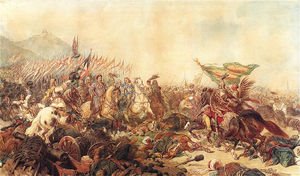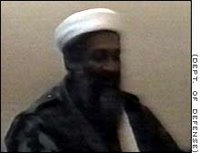
Certain words carry with them a cartload of negative connotations. “Fascism” is one of them. Images of Hitler and Mussolini jump to the forefront of a long line of dictators who fall under the category of brutal fascist leaders. The world is still grappling with the astonishing story of how British officials disrupted a plot to blow up a series of nine to ten commercial jets en route from the UK to the US. In his address to the nation shortly after the disclosure of the story, President Bush made the following remarks,
“The recent arrests that our fellow citizens are now learning about are a stark reminder that this nation is at war with Islamic fascists who will use any means to destroy those of us who love freedom, to hurt our nation.”
The term “Islamic fascists” created a firestorm of catcalls from Muslim groups in the US. Parvez Ahmed, of the Washington-based Council on American-Islamic Relations wrote President Bush Thursday to express his outrage. "Unfortunately, your statement this morning that America 'is at war with Islamic fascists' contributes to a rising level of hostility to Islam and the American-Muslim community.”
Is President Bush’s terminology appropriate or even accurate? In today’s world, it has become all too common to toss around words bogged down with heavy baggage and latch them onto a particular target, often with less than one hundred percent fidelity to the original meaning of the word. So the question is worth pondering. Most people usually have a general idea of what fascism means but it is difficult to crystallize a set definition around the word. Scholars debate among themselves as to a precise definition or whether this or that dictator really fits the bill as a fascist ruler. So determining whether or not Bush’s labeling of Islamic fascism is correct is not so cut-and-dry.
Typically, fascism is described as a form of government coupled with near complete control of every aspect of societal life, ranging from the political to the cultural and economic. In addition, we can throw in a strong dose of patriotism, or nationalism, and an intense glorification of war. The principle goals of most fascist regimes are twofold: industrial growth and national unity. It rejects the idea that the system of government itself can easily become the principle threat to civil liberties and rights, a theory clearly supported by the Founders of the United States, all the while embracing an organic rather than contractual view of the state. It substitutes the class-conflict rhetoric of Marx with that of a struggle between the races. The nation or race is given priority over the individual. Also central to fascist theory is the belief that might makes right. In other words, strength and power are the keys to a legitimate rule and that victory in battle alone is sufficient proof of the moral righteousness of the overall movement. In this can be seen the influence of Social Darwinism. Typically there is a charismatic leader who is entrusted with carrying out the objectives of the particular regime. Historian Robert Paxton adds this intriguing insight into fascism when he says that fascist movements typically focus on an “obsessive preoccupation with…decline, humiliation or victim-hood…and compulsive cults of purity.”
So in light of these peripheral observations, what can we say about the president’s usage of the term? The most glaring distinction that must be made is that Islamic terrorist organizations are not nation-states. These shadow cells blend in and out of a vast spectrum of nations, similar to parasites, making them difficult to identify or classify, given their numerous compositions and complex organizational structures. Their strength lies in their ability to operate, to a large degree, in secrecy and silence, with or without the knowledge of their host nations. In this regard, they do not fit the description traditionally associated with fascism. Certainly, terror groups associate a high degree of glory and honor to war, and victory in itself is seen by them as a sign of Allah’s favor and approval regarding the ends of their designs. After the Ottoman Empire reached the apex of its power, the armies of Islam suddenly faced a series of setbacks, starting with the Battle of Vienna; defeats that were, until then, virtually unheard of, as they had been nearly invincible in their takeover of vast tracts of land. Suddenly they were faced with a dilemma that carried with it theological implications. If their cause was indeed just, how could Allah allow such humiliating defeats at the hands of mere infidels? Victory should have been inevitable. It seems that Islamic terrorists today are driven by this same distorted belief system, despite history’s lesson to the contrary.

THE EXTENT OF OTTOMAN RULE
Robert Paxton’s inclusion of decline, humiliation, victim-hood and compulsory cults of purity in his outline of fascism is worthy of special attention, especially after discussing the previous point about victory and moral righteousness. In many of the grainy videos coming from terror leaders like Osama bin Laden, there are repeated references to historical grievances against Islam and the humiliation of suffering under Western occupation. Such examples range from the defeat of the Muslim forces in Spain, the Battle of Vienna and Lepanto, and the carving up and dismemberment of the Ottoman Empire by Western powers during the early stages of the twentieth century.


In addition, terror groups aggressively pursue dissidents from within the walls of their faith, purging it from those they perceive as carriers of doctrinal contagions, contaminating authentic Islam. It could be argued that their wrath against fellow Muslims who lack their theological purity is more violent than the fury shown against Westerners. Here we see all the components that Paxton mentioned in his outline of fascism: victimization (blaming the current poverty in Muslim lands on Western imperialism), focus on the tragic decline (the fall of the Ottoman Empire), humiliation at the hands of the West (the carving up of their lands after the fall of the Ottoman Empire) and doctrinal purity (violent attacks on fellow Muslims).

BIN LADEN, LIVING IN THE PAST
There is no doubt that such Islamic terror groups, however disparate, widely spread and numerous, are seeking to implement a totalitarian Muslim state on a grand scale. In light of Paxton’s additional contributions to understanding fascism, the other points made and the fact that fascism itself is a somewhat amorphous term with room for evolution, I believe Bush’s description is entirely appropriate.
Newsweek has an interesting article on the term and its rising popularity within the neoconservative lexicon.
http://www.msnbc.msn.com/id/14319984/

No comments:
Post a Comment